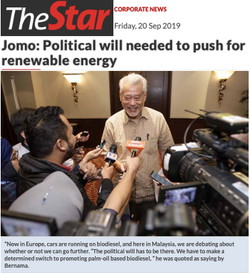- Jan 6
- 4 min read
KUALA LUMPUR, Malaysia, Jan 6 2026 (IPS) - While US President Donald Trump has blamed the BRICS and foreign investors for de-dollarisation, his rhetoric, actions and policy measures are mainly responsible for the trend’s recent acceleration.
Threats and reactions
Although Trump is not the sole cause of de-dollarisation, which began much earlier, well before he became president, his recent initiatives have accelerated the trend.
Despite some temporary reversals, the dollar’s post-World War II role as world reserve currency has gradually declined over the decades, especially since the 1970s. Ben Norton has argued that several Trump measures have accelerated this trend.
Trump claims his supposedly ‘reciprocal tariffs’ will reduce the US trade or current account deficit with the rest of the world. But if countries cannot export to the US, they cannot earn dollars to meet their trade and investment needs.
Many believe Trump’s tariffs and other threats are enhancing US leverage vis-à-vis others, but their reactions, including defensive countermeasures, are accelerating de-dollarisation.
Trump’s measures, such as his insistence on bilateral negotiations, have alarmed most nations, including long-time allies. As nations, including allies, rethink their economic relations with and vulnerability to the US, de-dollarisation inadvertently accelerates.
Trump vs the Fed
The US Federal Reserve Bank’s overnight lending or funds rate has been higher since 2022, responding to higher consumer price inflation following the pandemic and the Russian invasion of Ukraine.
As the Fed raised interest rates, yields on US government debt rose. But Trump now wants the Fed to cut interest rates to reduce the high debt servicing costs of both the government and private corporations.
In 2024, the US federal government paid about 3% of GDP in debt interest alone. Although such debt exceeds 120% of GDP, debt service costs are deemed manageable as long as interest rates remain low.
Trump’s pressures on the Fed to cut interest rates have inadvertently undermined investor confidence and prompted ‘flights [from dollar assets] to safety’.
Trump’s recent campaign against his earlier Fed chair appointee, Jerome Powell, has inadvertently raised investor concerns about his espoused monetary policy priorities.
Inflation fears persist
Investors now worry that Trump is pressuring the Fed to cut interest rates. They believe this will stoke inflation and cause the dollar to fall against other major currencies. As Trump is seen forcing down interest rates, he risks being blamed for persistent inflation.
If the Fed buys US Treasuries to reduce yields, for a new round of ‘quantitative easing’ (QE), dollar asset investments will realise lower, if not negative, real yields.
Although inflation hawks’ worst fears of higher inflation have not materialised so far, few believe tariffs will not raise inflation.
Expecting Trump 2.0 to impose more tariffs, many US companies stockpiled imports before April 2. As tariffs took effect and stocks declined, prices rose.
Many investors have sold their dollar assets as monetary authorities worldwide seek alternatives to the greenback. Such sell-offs lower the dollar’s value, further spurring de-dollarisation.
Trump now wants to lower US Treasury bond yields as foreign governments and investors seek alternatives to holding dollar assets.
Many are considering switching to non-dollar assets despite stagnation tendencies elsewhere in the Global North, especially in Europe and Japan. If investors stop buying dollar assets or sell them to purchase non-dollar assets, de-dollarisation will gain momentum.
Foreign demand falling
Washington is understandably worried that foreign investors will dump Treasury securities. In 2015, a third was held by foreigners, but this has since fallen to under a quarter.
The ‘Mar-A-Lago Accord’ proposal, which requires foreign governments to hold US Treasury ‘century bonds’ for 100 years despite assured losses, will compound resentment.
Lowering Treasury bond yields is both risky and difficult due to the highly financialised US economy. Past bond market turmoil has triggered stock market selloffs, lowering Treasury yields, share prices and tax revenue.
Government and corporate borrowing costs rise together. As trillions of dollars’ worth of corporate bonds mature over the next two years, high interest rates will raise corporations’ borrowing costs. Many want to refinance at lower interest rates.
These efforts to bring down interest rates are apparent to all. But lower interest rates and negative ‘actual yields’ for Treasury securities will ensure high inflation persists.
De-dollarisation accelerating?
Trump’s actions, especially threats of tariffs and sanctions, have elicited diverse reactions, often undermining dollar hegemony and accelerating de-dollarisation.
Many recent developments have undermined public confidence in the US government and the rule of law, accelerating de-dollarisation.
As investors sold US assets in mid-2025, the dollar saw its biggest fall since the 1973 oil price hike. It fell by over 10% against other major currencies, triggering temporary falls in the prices of many financial assets, including equities and bonds.
Since then, there has been increased capital market uncertainty and volatility, as in the US bond market, although a strong rally followed the ensuing stock market crash.
In many recent episodes of financial volatility, dollar liquidity was considered the safe option. But in 2025, confidence in dollar assets fell, prompting selloffs and de-dollarisation.
Thus far, Trump has been adept at managing short-term volatility, but his style implies no one knows when the music will stop.
Related IPS Articles
Available online here: Trump De-dollarisation Accelerant




















